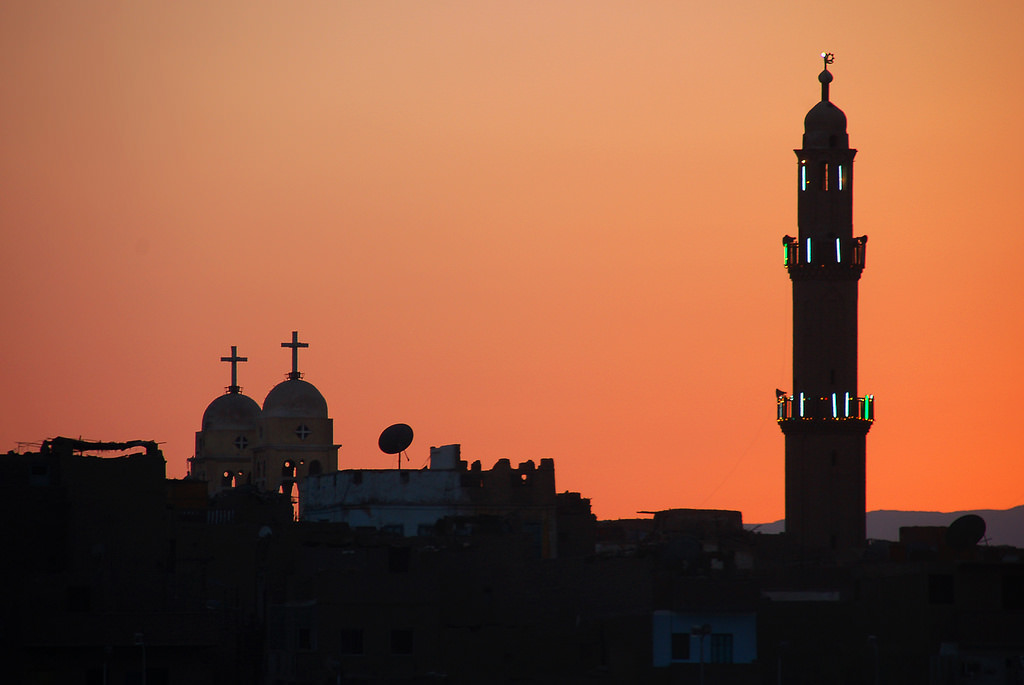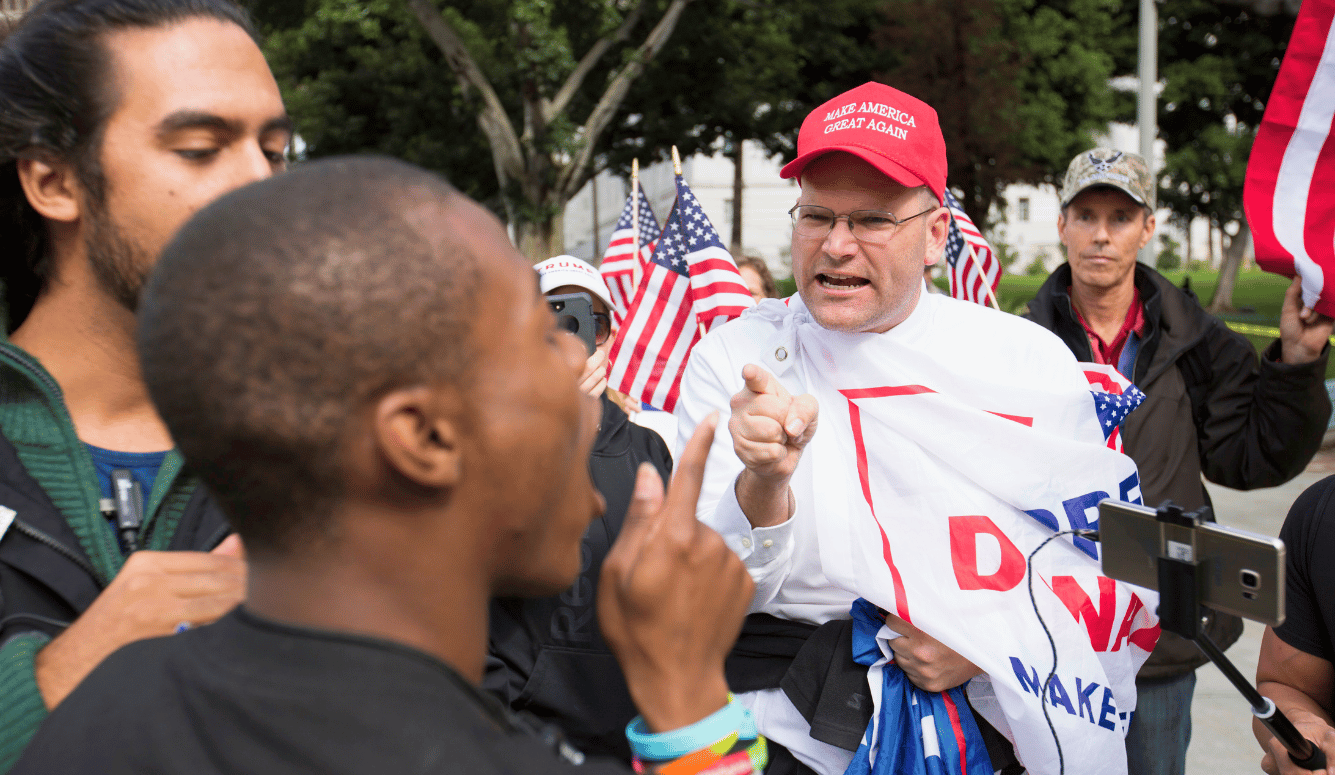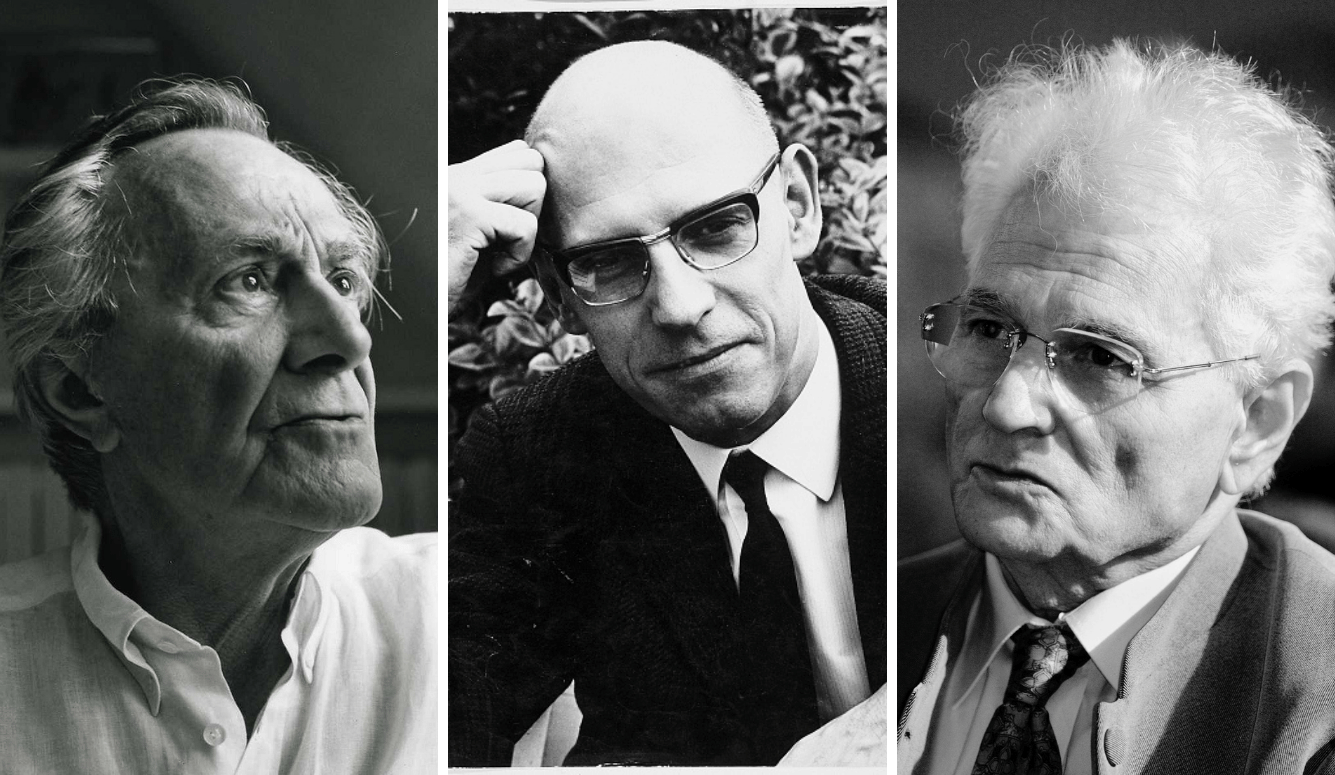Religion
Liberalism’s Great Challenge: How Can We Critique Ideas while Protecting People?
The words are usually associated with Eastern or New Age spirituality, and they sound as bizarre on the tongue of a science-minded atheist as an Arab Bible-believer.

Secular and reformist Muslims plead that we learn to tell the difference between critiquing ideas and attacking people.
When Islam is at question, members of the American Left and Right race into opposite corners. After the Orlando nightclub massacre, to cite one recent example, conservatives spewed anti-Muslim invective to the point that ordinary American Muslims were afraid to leave home. Donald Trump implied that Muslims, broadly, know when a fellow believer is going to shoot up a nightclub or government office but fail to act (as if gun-loving men, broadly, know when one of their fellows is going to shoot up a political rally or Black church or abortion clinic).
From their corner, liberals denied that Allah-blessed homophobia, or Islam’s concept of martyrdom, or the rallying cries of Jihadis might inspire a self-loathing, bipolar believer to redeem his soul through mass murder. Staff for U.S. Attorney General Loretta Lynch actually edited the shooter’s words of Islamic fidelity out of audio recordings for fear of inciting racist reprisals.
In the weeks that followed, as men claiming Islamist loyalties or shouting “Allahu akbar!” went on bloody rampages in Istanbul, Nice, Baghdad, Dhaka and Ansbach, the rhetorical divide simply got sharper. Left-leaning commentators talked about mental illness, domestic violence, gun access and economic disparities — all valid causal factors — but desperately avoided acknowledging the prayer mat in the room. The DNC put the Muslim parents of an American serviceman on display at their convention, and then waited for the inevitable insults from He Whose Toupee Cannot Hide His Missing Frontal Lobe. They were not long in coming.
“The problem,” said my daughter over dinner, “is that people can’t tell the difference between Islam-ophobia and Muslim-ophobia.” She’s right: The Left recognizes that millions and millions of Muslims are decent people and so insists that Islam itself is benign, while the Right sees Islamic teachings as pernicious and so treats Muslims — and unsuspecting Sikhs and random people who look remotely Middle Eastern — as if they all were capable of erupting into fundamentalist brutalities.
This is a serious problem. Humanity’s future depends on our ability to critique and revise outdated ideas while simultaneously living in an ever-more interdependent global community. That can’t happen if we build walls of suspicion along religious lines, forcing believers into defensive isolation. It also can’t happen if we pretend that Iron Age ideologies provide the blueprint for global harmony and sustainable, shared well-being.
Free and fierce debate is the fountainhead of innovation
After thousands of years of subsistence living under various kinds of dogma and authority, humanity’s circumstances changed radically over the last two hundred years. Daily production increased from $3 to $33 per person, and human life expectancy doubled because most people now survive childhood. Death from pregnancy, which used to kill one in ten women, has dropped to one in one hundred thousand where women have access to modern medicine.
The foundation of this progress is the hard-won freedom to criticize bad ideas, and bad religious ideas in particular. That’s because the biggest barrier to discovery is the false assumption that we already know what’s real. As Mark Twain said, “It ain’t what you don’t know that gets you into trouble. It’s what you know for sure that just ain’t so.” America’s engine of innovation owes its existence to Enlightenment philosophies that above all valued fierce debate and intellectual freedom. Where religion treated certitude as a virtue, the Enlightenment valued doubt. This new paradigm allowed people, as never before, to question dogmas, superstitions, power structures, social scripts, and false causal ideas handed down by religious authorities and imposed by force.
Freedom to question is what allowed modernity to emerge from the Dark Ages, when religion ruled with an iron sword. To put it more concretely, this intellectual freedom, coupled with the scientific method (which forces us to ask the questions that could prove us wrong) has brought us the industrial revolution, germ theory, and the information age. As we face the future on an overcrowded planet stripped bare by human need and greed, innovation — cultural, economic, and technological — is our only hope of averting collapse.
Religion fights to preserve Iron Age agreements
Moving forward, the task of creating broad, sustainable well-being is going to take every bit of cooperation, innovation, and intellectual honesty humanity can muster. That makes competing religious factions costly — especially those that make exclusive truth claims and denigrate outsiders. And in this regard, Islam is far from alone.
For centuries the Roman Catholic Church and derivative Protestant religions have done everything in their power to obstruct freedom of thought, inquiry, and speech — from destroying heathen temples and texts, to torturing and executing heretics on a mass scale, to imprisoning Galileo and killing other early scientists, to — in modern times — censoring books and homeschooling children and incessantly threatening hellfire whenever they feel their grip slipping.
Still today, a frightening minority of Christians want to impose their biblical worldview on the rest of us by any means necessary. And that worldview includes truly ghastly concepts — like holy war, chosen people, male headship, blasphemy, genital mutilation, blood sacrifice, and eternal torture — all given the imprint of righteous authority by an inerrant Bible or infallible Pope invoking the name of God. Biblical theocracy would look more like Saudi Arabia than America in the 21st Century.
The problem isn’t just religion
Humanity’s future may depend on free thought and intellectual rigor, but instead of protecting these engines of innovation, many members of the Left and Right are retreating full-speed into a post-modern morass in which mindshare goes to the highest bidder, and each person or institution has the right to their own “facts.”
While the cultural Right frantically tries to re-impose old orthodoxies and hierarchies, the Left is busy imposing an orthodoxy of its own, one in which all opinions are created equal; only white Christian men can be confronted with uncomfortable truths; pontification privileges mirror those on the Right, but in reverse; and evidence — rather than dictating priorities — is simply, selectively, a narrative tool in the service of ideology.
On both sides, feelings win arguments when logic and evidence fail. “I just know in my heart,” says the religious believer. “That offends me,” says the aggrieved social justice warrior, “Therefore, you must be racist or sexist or both.”
These positions abandon the most powerful tools we have to advance knowledge and solutions to problems. They also abandon real people.
Secular and reformist Muslims stand alone
As the Left and Right race in opposite directions, taking their cues from each other, two of the many groups left standing alone in no-man’s land are apostate and reformist Muslims, both of whom share the Enlightenment values of Western liberals but who view the Quran and Hadith in the way moderate and secular Christians view the books in the Bible — as human documents that reflect the views of the writers. Many feel abandoned by Westerners who love their own freedom but keep silent or echo “religion of peace” platitudes while bloggers are hacked to death in Pakistan and women flogged in Saudi Arabia for the crime of being raped.
Activist Faisal Saeed al Mutar, born in Babylon, raised in Baghdad and now living in the U.S, regularly calls out the hypocrisy of people that he and like minded activists call the “Regressive Left:”
When the Abortion clinic attack happened, all my Liberal friends were very confident that the attack was partly inspired by Christian beliefs about life and abortion and they were right. When the Orlando attack happened and the guy pledged allegiance to ISIS, my liberal friends say it has NOTHING to do with Islam.
When asked about the idea that the Afghani-American shooter was a closeted homosexual acting out of self-hatred, al Mutar says the theory make sense — within the context of “a repressive family and repressive ideology” which he and others are doing their best to fight, even as they struggle with bigotry against Arab and Muslim communities.
“There is a very growing number of I would say Arab young millennials, between 20 and 30, who are mostly advocating for human rights and secular liberal values, and I think that the United States and the West should stand in solidarity with these people,” says al Mutar. He points to Movements.org as one place to support this work.
Alishba Zarmeen, though not Arab, is one of those millennial advocates. Of Pakistani heritage, Zarmeen alternates between anger and anguish about human rights violations in the name of Islam. “My heart breaks every time I think of Raif Badawi and his family,” she writes on Facebook. “ISIS is just one version of religious stupidity.” Badawi is a Saudi blogger sentenced to 10 years and 1000 lashings for insulting Islam. To date, he has spent four years in prison while his wife and young daughters in Toronto plead fruitlessly for his release.
When Sufi singer Amjad Sabri was gunned down by fundamentalists in Karachi in June, Zarmeen raged against both Islamist invaders and the Western Left:
The Regressive Left is first to talk about imperialism but they don’t know that European colonialism’s damage was NOTHING compared to the kind of destruction and chaos Arab Islamic imperialism has caused in the East (Persian, Mongol, and Indian empires were all fucked over) for the past 1500 years. My culture is not mindless recitations in Arabic with togas and Niqabs and Hijabs for clothing. My cultural heritage is much more colourful, happier, and full of music and a sense of building a community. But all religion wants to do is destroy colors unless it’s the color of red blood.
Zarmeen’s Pakistani and expat friends lament the spread of Wahhabi fundamentalism fueled by oil revenues. They cheer moderates who defy forced fasting during Ramadan. They post clips of clerics saying that rape and beating are appropriate punishments for uppity females. They share photos of women who claim the ‘stealthy freedom’ to peel out of mandatory hijab long enough to feel the wind in their hair and snap selfies. And, in between, they celebrate life, love, pregnancy, and Pakistani pastries.
Beyond the polarities of denial and racism
For any religious sect that is caught between archaic orthodoxies and an uncertain future, external criticism is more likely to trigger defensive retrenchment than reform. That is why, as a former Evangelical, I center my critique of fundamentalist religion on my own tradition. Distorted Western criticism of Islam — often infused with bigotry — makes it harder, not easier for the voices of Muslim reformers to be heard.
A better future demands that we get better at acknowledging cultural and psychological complexities and multifaceted disagreements that don’t fit neatly into binary buckets. Yes, some Muslims do terrible things under the influence of terrible dogmas and authorities. So do some Christians. Religion is a powerful intoxicant that can disinhibit humanity’s worst impulses along with expressing some of the best. Fortunately, most believers instinctively recognize the difference, and they manage to get along just fine despite the very mixed messages in the Quran and the Bible.
But mixed they are. So maybe, just once in a while, rather than jumping to either defend or attack Islam, outsiders should listen to the voices of Muslim reformers like Maajid Nawaz or Hamza Yusuf, or former Muslims like Ayaan Hirsi Ali or Maryam Namazie or Ali A Rizvi. Not that these five are wholly aligned with each other — far from it. But they all speak from a kind of lived experience that most Americans lack. Consequently, they are far less likely than outside pundits or politicians to confuse Muslim people with Islam as an ideology.
Mosab Hassan Yousef is the son of a Hamas commander who worked undercover for Israel’s internal security service and converted to Christianity. Yousef is a harsh critic of Islam, which he calls “a state of consciousness that calibrates in darkness, that calibrates in the seventh or sixth centuries.”
Yousef and I have different religious and political convictions. As a former Bible believer who writes about recovery from religion, I think that Bible-belief, unfettered, is every bit as capable as Islam of promoting spiritual stagnation and atrocity. But on two fundamentals, we both agree: First, people are the same, all over the world, and we must never forget our shared ancestry or shared hopes for the future. Second, though, outdated ideas and ideologies must be challenged if those hopes are ever to be fulfilled.
Disowned by his father and reviled by former colleagues, Yousef nonetheless emphatically differentiates people from ideologies:
I cannot be against my mother and my father and my people. They are just people. And there are idiots everywhere, in every nation. But I am talking about the collective consciousness of nations, of regions, and the cosmic consciousness of all humanity.
The term “cosmic consciousness” dates back to the beginning of the 20th Century, and it refers to humanity’s evolution toward a shared recognition that we all are part of a greater whole. The words are usually associated with Eastern or New Age spirituality, and they sound as bizarre on the tongue of a science-minded atheist as an Arab Bible-believer. But we really are talking about something that dramatic.
Humankind faces an enormous challenge: Can we bring forward our collective consciousness so that Arab and Jew, Christian and atheist, Muslim and Hindu can transcend tribal identities and mutually exclusive truth claims to live together in peace? The alternative is truly as dark as the 6th Century.





